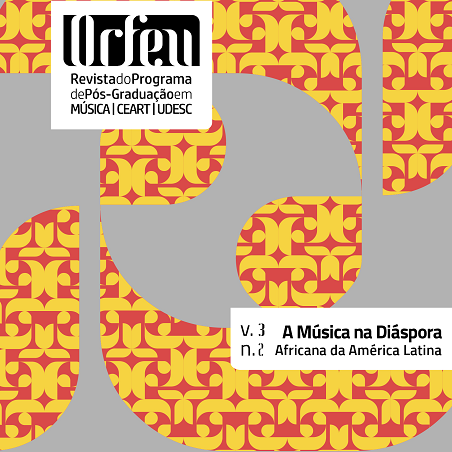Ethnic-Racial Relations and Music Teaching: considerations of ethnic knowledge in school practices
DOI:
https://doi.org/10.5965/2525530403022018096Keywords:
school practices, ethnic-racial diversity, knowledge productionAbstract
This paper discusses the ethnic-racial education not only as a “content” of the curricular components, but mainly as a process of expansion for different epistemologies, cosmologies, for different possibilities of transmission and production of knowledge. This implies a revision of values and concepts, repositioning of hierarchies, modifications of spatial structures, among other aspects. From this perspective I present some reflections about my job as a primary school teacher in the arts-music discipline, at the same time in dialogue with the anthropological and ethnomusicological theories, areas that I studied in master and doctorate degree while was working in school. I discuss theoretical notions of “school as frontier” (TASSINARI, 2012), “appropriate dispositions” (INGOLD, 2000), “dancing ear” (OLIVEIRA, 2015), “musicalization of the other” (HILL, 2014) at the same time with the school experiences. With this, I try to problematize the school knowledge, the routines that do not allow the validation of other ways of learning, other ways of relating to and producing knowledge.
Downloads
References
ALMEIDA, M. Berenice; PUCCI, Magda D. Outras terras, outros sons. São Paulo: Callis, 2002. (Acompanha CD).
BEAUCHAMP, Jeanete; PAGEL, Sandra Denise; NASCIMENTO, Aricélia Ribeiro do. (Orgs). Ensino fundamental de nove anos: orientações para a inclusão da criança de seis anos de idade. Brasília: Ministério da Educação. Secretaria de Educação Básica, 2007.
BLACKING, John. How Musical is Man?. Seattle and London: University of Washington Press, 1974.
BLACKING, John. Venda Children’s Songs: a study in ethnomusicological analysis. Witwatersrand University Press, 1967.
BRASIL. Parâmetros Curriculares Nacionais: arte. Secretaria de Educação Fundamental. Brasília: MEC/SEF, 1997.
BRASIL. Lei 10.639/2003, de 9 de janeiro de 2003. Altera a Lei nº 9. 394, de 20 de dezembro de 1996. Diário Oficial da União, Poder Executivo, Brasília.
BRASIL. Lei 11.645/08 de 10 de Março de 2008. Diário Oficial da União, Poder Executivo, Brasília.
COHN, Clarice. Antropologia da Criança. Rio de Janeiro: Jorge Zahar, 2005.
DIRETRIZES CURRICULARES NACIONAIS PARA A EDUCAÇÃO DAS RELAÇÕES ÉTNICO-RACIAIS E PARA O ENSINO DE HISTÓRIA E CULTURA AFRO-BRASILEIRA E AFRICANA. Brasília-DF. 2004.
GIOIELLI, Décio. A Mbira da beira do rio Zambeze. São Paulo: Moderna, 2007 (acompanha CD).
HARDMAN, Charlote. Can there be na anthropology of children? Childhood, v.8, n. 4, p.501-517, 2001.
HILL, Jonathan. Musicalizando o outro: Etnomusicologia na era da Globalização. In: MONTARDO, Deise L; DOMÍNGUEZ, Maria Eugênia. Arte e Sociabilidade em Perspectiva Antropológica. Florianópolis: Ed. da UFSC, 2014, p. 13-46.
LAVE, Jean. Aprendizagem como/na prática. Horizontes Antropológicos, Porto Alegre, ano 21, n. 44, p. 37-47, jul./dez. 2015.
MATRIZ CURRICULAR PARA EDUCAÇÃO DAS RELAÇÕES ÉTNICO-RACIAIS NA EDUCAÇÃO BÁSICA. Prefeitura Municipal de Florianópolis. Secretaria Municipal de Educação. Florianópolis, 2016.
MELO, Clarissa Rocha de. Aprendizado, percepção e conhecimento Guarani: possibilidades de diálogo entre saberes distintos. In: TASSINARI, A.; ALMEIDA, J.; RESENDÍZ, N. Diversidade, Educação e Infância: reflexões antropológicas. Florianópolis: Ed. da UFSC, 2014, p. 295-329.
OLIVEIRA, Allan Paula. O ouvido dançante: música popular entre swings e cangotes. El Oído Pensante, v. 3, n. 2, p. 1-21, 2015.
ORIENTAÇÕES CURRICULARES: expectativas de aprendizagem para a educação étnico-racial na educação infantil, ensino fundamental e médio / Secretaria Municipal de Educação – São Paulo : SME / DOT, 2008.
PLANO NACIONAL DE IMPLEMENTAÇÃO DAS DIRETRIZES CURRICULARES NACIONAIS PARA A EDUCAÇÃO DAS RELAÇÕES ÉTNICO-RACIAIS E PARA O ENSINO DE HISTÓRIA E CULTURA AFRO-BRASILEIRA E AFRICANA. Ministério da Educação. Secretaria de Educação Continuada, Alfabetização, Diversidade e Inclusão. Brasília: MEC, SECADI, 2013.
SCHAFER, Murray. O ouvido pensante. São Paulo: Fundação Editora da UNESP, 1991.
TASSINARI, Antonella. e COHN, Clarice. Escolarização indígena entre os Karipuna e Mebengokré-Xikrin: uma abertura para o outro. In: TASSINARI, A; GRANDO, B; ALBUQUERQUE, M. (Orgs). Educação Indígena: reflexões sobre noções nativas de infância, aprendizagem e escolarização. Florianópolis: Ed. da UFSC, 2012, p. 247-274.
TASSINARI, Antonella. A sociedade contra a escola. In: TASSINARI, A; GRANDO, B; ALBUQUERQUE, M. (Orgs). Educação Indígena: reflexões sobre noções nativas de infância, aprendizagem e escolarização. Florianópolis: Ed. da UFSC, 2012a, p. 275-294.
TASSINARI, Antonella. Introdução: sobre noções nativas e antropológicas em educação indígena. In: TASSINARI, A; GRANDO, B; ALBUQUERQUE, M. (Orgs). Educação Indígena: reflexões sobre noções nativas de infância, aprendizagem e escolarização. Florianópolis: Ed. da UFSC, 2012b, p. 15-24.
TASSINARI, Antonella. Ajudando e aprendendo: a participação de crianças nas atividades produtivas da agricultura familiar. In: TASSINARI, A.; ALMEIDA, J.; RESENDÍZ, N. Diversidade, Educação e Infância: reflexões antropológicas. Florianópolis: Ed. da UFSC, 2014, p. 97-132.
Downloads
Published
How to Cite
Issue
Section
License
Copyright (c) 2018 ORFEU

This work is licensed under a Creative Commons Attribution 4.0 International License.
Authors who submit their manuscripts to be published in this journal agree to the following terms:
1. Authors retain the copyright and grant to the journal the right of first publication, whilst simultaneously permitting their work to be licensed under the Creative Commons License Attribution, which allows the sharing of work with recognition of the authorship and initial publication in this journal.
2. Contributions in this journal are open access; this means they are based in free use, and non-commercial applications.






